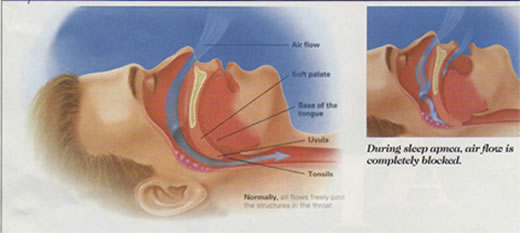|
What is Obstructive Sleep Apnea?
 Obstructive sleep apnea is a serious and potentially life threatening condition, which involves the airway collapse of the pharynx during sleeping periods. This airway collapse is caused by a decrease in muscle tone by either the pharynx, the tongue, soft palate or a combination of these muscles. A second important contributing factor is the abnormal anatomy between the nasal aperture and the vocal cords, at the level of the soft palate, base of tongue or mandible. The overall result of this collapse results in apnea – the cessation of airflow for an extended duration; a process in which the collapsed airway prevents airflow despite persistent ventilatory effort and thus it is appropriately called obstructive sleep apnea. Obstructive sleep apnea is a serious and potentially life threatening condition, which involves the airway collapse of the pharynx during sleeping periods. This airway collapse is caused by a decrease in muscle tone by either the pharynx, the tongue, soft palate or a combination of these muscles. A second important contributing factor is the abnormal anatomy between the nasal aperture and the vocal cords, at the level of the soft palate, base of tongue or mandible. The overall result of this collapse results in apnea – the cessation of airflow for an extended duration; a process in which the collapsed airway prevents airflow despite persistent ventilatory effort and thus it is appropriately called obstructive sleep apnea.
Who gets Obstructive Sleep Apnea?
It is estimated that about 40 million Americans have some type of sleeping disorder. Of this population, 12 million Americans will be diagnosed to have some form of obstructive sleep apnea. Obstructive sleep apnea affects approximately 5% of the adult population. Sleep apnea would be most prevalent among the obese, males and older population. There also appears to be higher incidence of obstructive sleep apnea in patients with other systemic diseases, such as hypertension.
What are the signs of symptoms of Obstructive Sleep Apnea?
Loud snoring, with episodes of silence, during which the snorer struggles unsuccessfully to breathe is a cardinal sign of obstructive sleep apnea. Other common signs or symptoms that are reported are excessive daytime sleepiness (EDS), memory loss, job ineffectiveness, mood alterations or personality, short term memory loss, and reduced libido. Sometimes, some people may report falling asleep while driving, working, watching television and other activities.
What are some non-surgical treatments for Obstructive Sleep Apnea?
Non-surgical treatments that can be recommended for patient vary due to severity of the sleep apnea. Mild obstructive sleep apnea can be treated by behavior modifications. For moderate sleep apnea, other ways to non-surgically treat obstructive sleep apnea patients is through continuous positive pressure airway pressure (CPAP). CPAP is a device applies a constant but low positive air pressure to the upper airway to keep it open and patent. In many people, a dental repositioning device may help open the airway by positioning the lower jaw forward and moving the muscles of the tongue base and throat forward as well.
What are some surgical treatments of Obstructive Sleep Apnea?
In more severe cases of obstructive sleep apnea or in cases where CPAP has failed or is not tolerated, surgical means to help treat obstructive sleep apnea is available. Nasal surgery may be used alone or in conjunction with other procedures but is rarely curative. Uvulopalatopharyngoplasty (UPPP) and laser-assisted uvulopalatoplasty (LAUP) are procedures in which the uvula and portions of the soft palate are removed to enlarge the oropharyngeal airway. LAUP can reduce snoring effectively but has not shown to be effective in treating obstructive sleep apnea. UPPP is a major surgical procedure performed in an operating room setting that can result in symptomatic improvement of sleep apnea in moderate cases and reduce snoring significantly. However, UPPP only will treat patients with obstructive sleep apnea at the level of the soft palate. For obstructions or collapse at the level of the tongue base, the most effective treatment for obstructive sleep apnea is jaw advancement surgery. The muscles of the base of tongue and throat are connected to the lower jaw. The advancement of the lower jaw puts tension on these muscles and pulls the tongue forward. This movement removes the obstruction and allows the airway to open. The advancement of the jaw is usually done in both lower and upper jaws to allow the occlusion or bite to remain the same. For more information regarding jaw advancement surgery, contact Dr. Weil or Dr. Koo, experienced oral and maxillofacial surgeons in this area.
|






 Obstructive sleep apnea is a serious and potentially life threatening condition, which involves the airway collapse of the pharynx during sleeping periods. This airway collapse is caused by a decrease in muscle tone by either the pharynx, the tongue, soft palate or a combination of these muscles. A second important contributing factor is the abnormal anatomy between the nasal aperture and the vocal cords, at the level of the soft palate, base of tongue or mandible. The overall result of this collapse results in apnea – the cessation of airflow for an extended duration; a process in which the collapsed airway prevents airflow despite persistent ventilatory effort and thus it is appropriately called obstructive sleep apnea.
Obstructive sleep apnea is a serious and potentially life threatening condition, which involves the airway collapse of the pharynx during sleeping periods. This airway collapse is caused by a decrease in muscle tone by either the pharynx, the tongue, soft palate or a combination of these muscles. A second important contributing factor is the abnormal anatomy between the nasal aperture and the vocal cords, at the level of the soft palate, base of tongue or mandible. The overall result of this collapse results in apnea – the cessation of airflow for an extended duration; a process in which the collapsed airway prevents airflow despite persistent ventilatory effort and thus it is appropriately called obstructive sleep apnea.